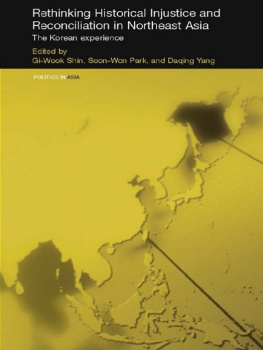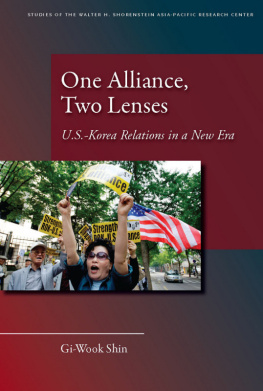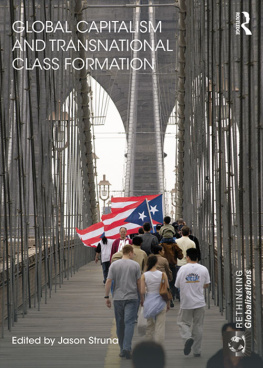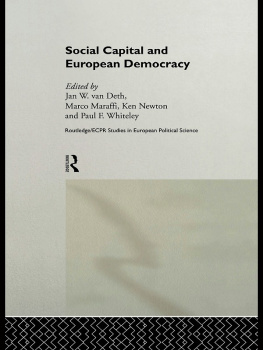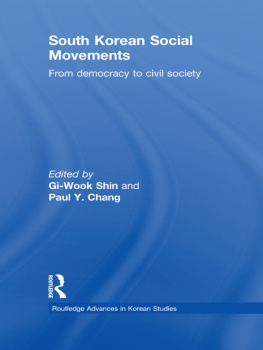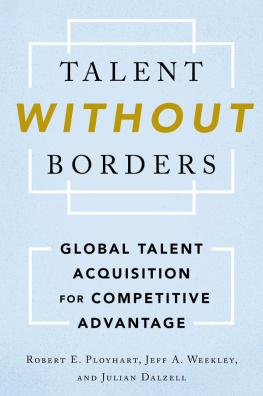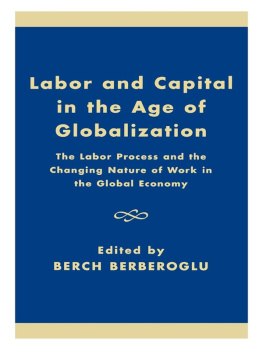Stanford University Press
Stanford, California
2015 by the Board of Trustees of the Leland Stanford Junior University.
All rights reserved.
No part of this book may be reproduced or transmitted in any form or by any means, electronic or mechanical, including photocopying and recording, or in any information storage or retrieval system without the prior written permission of Stanford University Press.
Printed in the United States of America on acid-free, archival-quality paper
Library of Congress Cataloging-in-Publication Data
Shin, Gi-Wook, author.
Global talent : skilled labor as social capital in Korea / Gi-Wook Shin and Joon Nak Choi.
pages cm(Studies of the Walter H. Shorenstein Asia-Pacific Research Center)
Includes bibliographical references and index.
ISBN 978-0-8047-9349-0 (cloth : alk. paper)ISBN 978-0-8047-9433-6 (pbk. : alk. paper)
1. Foreign workersKorea (South) 2. Skilled laborKorea (South) 3. Social capital (Sociology)Korea (South) 4. Human capitalKorea (South) 5. TransnationalismEconomic aspectsKorea (South) 6. GlobalizationEconomic aspectsKorea (South) I. Choi, Joon Nak, 1977 author. II. Title. III. Series: Studies of the Walter H. Shorenstein Asia-Pacific Research Center.
HD8730.5.S45 2015
331.6'2095195dc23
2014035015
ISBN 978-0-8047-9438-1 (electronic)
Typeset by Newgen in 11/14 Garamond
Global Talent
SKILLED LABOR AS SOCIAL CAPITAL IN KOREA
Gi-Wook Shin and Joon Nak Choi
Stanford University Press
Stanford, California
THE WALTER H. SHORENSTEIN ASIA-PACIFIC RESEARCH CENTER
Studies of the Walter H. Shorenstein Asia-Pacific Research Center
Andrew G. Walder, General Editor
The Walter H. Shorenstein Asia-Pacific Research Center in the Freeman Spogli Institute for International Studies at Stanford University sponsors interdisciplinary research on the politics, economies, and societies of contemporary Asia. This monograph series features academic and policy-oriented research by Stanford faculty and other scholars associated with the Center.
ALSO PUBLISHED IN THE SHORENSTEIN ASIA-PACIFIC RESEARCH CENTER SERIES
Failed Democratization in Prewar Japan: Breakdown of a Hybrid Regime
Harukata Takenaka (2014)
New Challenges for Maturing Democracies in Korea and Taiwan
Edited by Larry Diamond and Gi-Wook Shin (2014)
Spending Without Taxation: FILP and the Politics of Public Finance in Japan
Gene Park (2011)
The Institutional Imperative: The Politics of Equitable Development in Southeast Asia
Erik Martinez Kuhonta (2011)
One Alliance, Two Lenses: U.S.-Korea Relations in a New Era
Gi-Wook Shin (2010)
Collective Resistance in China: Why Popular Protests Succeed or Fail
Yongshun Cai (2010)
The Chinese Cultural Revolution as History
Edited by Joseph W. Esherick, Paul G. Pickowicz, and Andrew G. Walder (2006)
Ethnic Nationalism in Korea: Genealogy, Politics, and Legacy
Gi-Wook Shin (2006)
Prospects for Peace in South Asia
Edited by Rafiq Dossani and Henry S. Rowen (2005)
Contents
Online appendixes containing the survey instruments used in the research for this book can be accessed at www.sup.org/globaltalent.
Figures, Maps, and Tables
FIGURES
MAP
TABLES
Acknowledgments
We could not have written this book without the support, advice, and encouragement we received from several of our colleagues. We would like to recognize our hard-working research assistants, especially Eun Jung (Jane) Choi, Hilary Izatt, Hyojung (Julia) Jang, Ji-woong Kang, and Joyce Lee, for their extensive efforts collecting and coding data. We would also like to thank Rafiq Dossani, Ho-ki Kim, and Kirak Ryu, who co-authored several policy reports with us and helped us collect some of the data we used here, and Paul Chang and Seung Hoan (Alex) Jeon for introducing us to key interview respondents. We would like to thank Mark Granovetter, Rachel Harvey, Jaeeun Kim, Sookyung Kim, Jung-eun Lee, Rennie J. Moon, Woody Powell, and two anonymous reviewers for providing valuable suggestions, and our editors Andy Walder and Geoffrey Burn for their advice and steadfast support. Last but certainly not least, we gratefully acknowledge the support of the Hana Financial Group and especially former chairman Kim Seunghyu. Of course, any omissions or errors remain our own.
ONE
Toward a New Model of Engaging Skilled Foreigners
The story of Koreas economic miracle is now well known throughout the world. Over the past 50 years, the Republic of Korea (henceforth Korea) has gone from one of the least developed countries to one of the most developed. Today, Korea ranks among the 31 high-income members of the Organisation for Economic Co-operation and Development (OECD) and is classified as an advanced economy by ratings firms, including the FTSE (Financial Times and London Stock Exchange), Standard and Poors, and Dow Jones. As the only member of this prestigious club that has gone from a recipient to a provider of official development aid (ODA), Korea has become a model for many other developing countries that seek to replicate its success. Koreas economic rise has been accompanied by social development as well; according to the 2010 Human Development Index (HDI), a broad measure of social development, Korea scores virtually identical to Japan and above France, Great Britain, and Italy. Today, Korea has gained a place in the sun as an advanced nation with firms like Samsung Electronics and Hyundai Motors, which have become global leaders.
Yet economic development has come with new challenges. As a wealthy, high-income developed country, Korea is increasingly experiencing the same competitive challenges from newly industrializing countries as other advanced nations. In recent years, many countries have followed Koreas formula for development: exporting industrial goods and using the proceeds to invest in more advanced technology, gradually moving up the technology ladder to produce increasingly profitable goods. Through this process, industrializing countries like China have become increasingly sophisticated competitors in the same export industries that Korea has recently dominated, including automobiles, consumer electronics, and shipbuilding. Cutthroat competition in such industries harms Korea more than it does other developed countries that rely less upon manufacturing and more on lucrative service sector industries such as finance and business services. Having reached the limits of export-oriented industrialization, Korea is now attempting to find new engines of economic growth. Toward this end, the previous Lee Myung-bak administration promoted a knowledge-based economy while the current Park Geun-hye government is pursuing a creative economy, emphasizing the development of advanced services and complementing Koreas historical strengths in electronics hardware with software expertise.
Such efforts have been hampered by Koreas shortage of top-tier global talent. Korea has an extensive system of higher educationindeed, nearly 70 percent of Koreans between 25 and 34 years of age hold the equivalent of a bachelors degree, the highest in the OECD.
One potential solution for Korea is to follow countries like the United States and Canada in recruiting talented foreigners who possess the prized skills mentioned above. A large literature on economic growth has long considered skilled foreigners instrumental for enhancing a countrys economic competitiveness. As Kirkegaard (2007: 12) argues, The long-term economic growth of an advanced country... is with certainty highly cor One needs to look no further than Silicon Valley, which could not have obtained and maintained its status as the center of the global technology industry without an influx of talented Indian and Chinese engineers.


